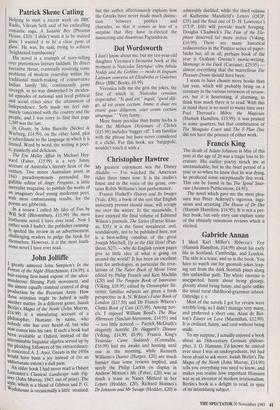Patrick Skene Catling
Helping to start a recent week on BBC Radio, Vikram Seth said of his enthralling romantic saga, A Suitable Boy (Phoenix House, £20): 'I didn't want it to be stained glass; I wanted it to be a clear pane of glass.' He was, he said, trying to achieve heightened translucency'.
His novel is a triumph of story-telling over pretentious literary faddism. Its direct narrative thrust, eventually resolving some problems of modern courtship within the traditional match-making of conservative Indian family life, continuously gains strength, in no way diminished by inciden- tal episodes of national and local political and social crises since the attainment of Independence. Seth made me feel inti- mately concerned with the country and the People, and I was sorry to find that page 1,349 was the last.
In Ghosts, by John Banville (Secker & Warburg, £14.99), on the other hand, plot is subordinate to the language in which it is limned. Word by word, the writing is poet- ic, painterly and delicious. The Ern Malley Affair by Michael Hey- ward (Faber, £15.99) is a very funny account of Australia's literary hoax of the century. Two minor Australian poets in 1943 pseudonymously persuaded the gullible editor of Angry Penguins, a little surrealist magazine, to publish the works of an imaginary dead young modernist poet, with most embarrassing results, for the Poems are gibberish. In a review I called My Idea of Fun by Will Self (Bloomsbury, £15.99) 'the most loathsome novel I have ever read'. Now I rather wish I hadn't; the publisher cunning- ly quoted the review in an advertisement, challenging readers to judge the book for themselves. However, it is the most loath- some novel I have ever read.










































































 Previous page
Previous page